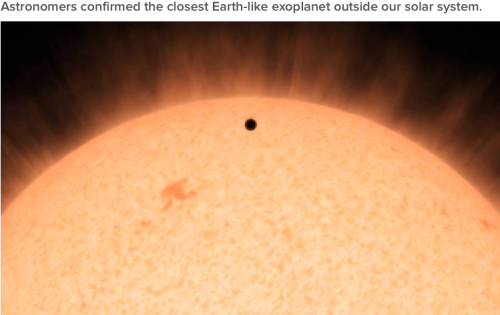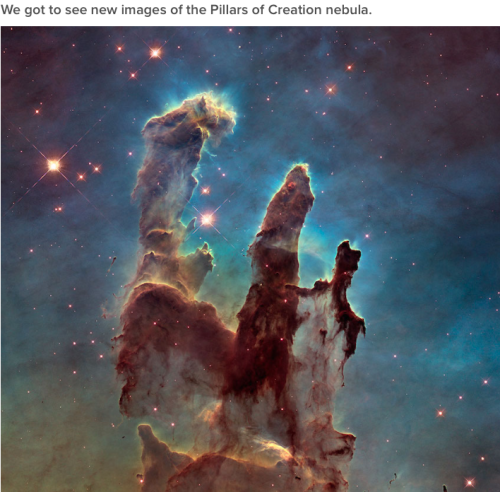Space & The Universe:

Disclaimer: These are online resources that I have found, They are not meant to be your only source of study, instead you can use them to your enhance your normal study. I don’t know what level these resources are aimed at, but I’ve tried to provide a range for a number of different topics. I don’t study Physics, so I don’t know how accurate these are, or how they relate to course syllabi.
Space & the universe:
How do we know the Big Bang actually happened?
Visible Earth - A catalogue of satellite images of our home planet detailing everything from atmospheric data to city lights or natural disasters.
NASA - NASA homepage with links to other NASA sites. FAQ
British National Space Centre - Site containing information about current satellites launches, solar system and Earth observation. There are links from the ‘Learning Zone’ to other Space sites.
Online Physics Lecture Notes - A directory of online undergraduate level astronomy and physics lecture notes from various universities.
Physics in Perspective: 2013 lectures - Video: Dr Andreas Freise talks about finding black holes with lasers.
Galileo: An educational film - An educational film dramatising the life of Galileo and his scientific discoveries.
Why our universe might exist on a knife-edge
Is our universe the only universe?
Distant time and the hint of a multiverse
The hunt for a supermassive black hole
The story behind the Mars Rovers
The design of the universe
Shedding light on dark matter
Why did Pluto get kicked out of the planet club?
Geocentrism and heliocentrism
Newton’s Law of Universal Gravitation
An overview of orbital mechanics
Orbital mechanics - These drawings simplify the physics of orbital mechanics, making it easy to grasp some of the basic concepts.
Gravity is More Than a Name
Circular and Satellite Motion Interactives
Vectors, Motion & Momentum
Vectors - Motion and Forces in Two Dimensions
Vectors, Projectiles, and 2-D Motion Interactives
One dimensional motion - velocity, speed, time, acceleration, projectiles.
Two dimensional motion - projectile velocity, inclines, centripetal force and acceleration.
Introduction to vectors and scalars - Khan Academy (YouTube)
Physics: Introduction to Vectors (YouTube)
Momentum and Its Conservation
Momentum and Collisions Interactives
1-D Kinematics Interactives
The simple pendulum - Excellent animations proving assorted points about the simple harmonic motion approximation for pendulums.
The Physics of Body Mechanics
Momentum and forces (BBC Bitesize)
Forces and Newton’s laws
Impacts and linear momentum
Moments, torque and angular momentum
Oscillatory motion
Work & Energy:
Work, Energy, and Power
Work and Energy Interactives
Introduction to work and energy - Khan Academy
SparkNotes: SAT Physics: Work, Energy, and Power
Thermal Physics:
Thermal Physics
Thermodynamics
SparkNotes: SAT Physics: Thermal Physics
Thermal Physics - Heat and Temperature (YouTube)
Electricity & Magneticism:
Static Electricity
Static Electricity Interactives
The Electromagnetic Spectrum Song by Emerson & Wong
Electromagnetic Spectrum - Introduction
Electricity and magneticism (Khan academy)
Current Electricity
Magnetism Interactives
Direct Current Versus Alternating Current
Circuits
Circuit symbols review notes
Circuit components overview
Resistors in Circuits
Batteries in Circuits
Capacitors in Circuits
Online circuit lab
Electric Current
Electric Resistance
Electric Power
Light & Sound:
Waves
Waves and Sound Interactives
Sound Waves and Music
Mechanical waves and sound
Light Waves and Color
Light waves
Reflection and the Ray Model of Light
Refraction and Lenses Interactives
Refraction and the Ray Model of Light
Circles of light: the mathematics of rainbows - An in-depth study of the mathematics involved in the study of rainbows. For advanced students only.
The Discovery Of Radioactivity - 100 years ago, a group of scientists unknowingly ushered in the Atomic Age. Their work initiated paths of research which changed our understanding of the building blocks of matter.
Light: Particle or a Wave?
Refraction of Light
Diffraction of Light
Sources of Visible Light
Laser Fundamentals
Prisms and Beamsplitters
What is the speed of dark? Vsauce. YouTube (2014).
Primary Colors
Diffraction of Light
Atoms:
The Discovery and Research on the Atom - A description of some of the important developments in understanding the atom an its constituents. Some parts of the site are very mathematical and go beyond college level physics.
Large Hadron Collider finds elusive new particle after 50 years
Building atoms
Revise atom structure (S-cool, intro level)
Build an atom - Move the electrons, protons and neutrons yourself to create different atoms.
Definitions & Tools:
Torques - Definitions of various torques, statements of Euler’s equations.
Elasticity - Definitions for a selection of topics related to elasticity.
Forces - Glossary of terms and mathematical derivations for various forces.
Friction - A few good definitions relating to friction.
Mass and Weight - Brief definitions for various mass and weight related topics.
A Dictionary of Units of Measurement - The history and conversion of different numeric systems
Physics Forums - A busy forum covering every physics topic under the sun. Great for everything from homework questions to discussing the origins of the universe.
The Laws List - The Laws List is an alphabetised guide featuring several hundred laws, rules, principles and other related topics in physics, from aberration to the Zeeman effect.
Astro Physical Calculator - A fully working physical calculator with physical constants stored in memory.
Other:
Introduction to MRI physics - A detailed page on the workings of mri scanners with lots of animations (requires shockwave).
How Does a Cat Land on its Feet? - The saying is that cats always land on their feet. This animation explains how they do this.
X‑rays
What physics taught me about marketing
Physics Timeline
Careers:
Careers in physics
What can I do with my degree in physics?
Careers In Physics - American Physical Society
Important Dates and Discoveries - The Physics of the Universe
More Posts from Space-m17-blog and Others


M-theory
Membrane theory is a relatively new theory in the world of physics. It has been backed by Stephen Hawking as being the only candidate for the complete theory of the universe.
M-theory has been growing very popular in recent years. This is because it ties together the existing string theories into one relatively simple (mathematically) depiction of the universe. The true origins start with the older string theories that came about in the 80’s. This outlined how all the different forms of energy in the universe could be constructed out of hypothetical one dimensional “strings”. The current M-theory now believes in an 11 dimensional space (this was previously 10 in earlier versions of string theories but the introduction of supergravity increased the count to 11). Now we live in a 3D space with a total of four observable dimensions meaning that there are another 5 we cannot detect. Now in string theory, it was hypothesised that depending on how the strings vibrate the might be seen in 3 dimensions as matter, light or gravity. The problem with string theory was that different equations used to describe the vibrations of the strings kept coming out and they all appeared to be correct. Then what happened was M-theory which said that it’s possible that all the equations are describing the same thing but from a different perspective.
My current understanding of M-theory is that there are lots of 2D membranes which are in an 11D space. These two dimensional branes are not fixed in this eleven dimensional space and move around. When they collide a new 2D brane is created and it is thought that when this happens it is similar to a Big Bang. So it’s entirely possible that out universe is really a 2D membrane in an 11D space.
The first image is a Calabi-Yau manifold. It’s a multi-dimensional mathematic structure and is very significant to M-theory, all they have to do is find the “right” one.

Interstellar bow


To visualise the black hole in Interstellar, the VFX team collaborated with theoretical physicist Kip Thorne to solve the equations for propagation of light around a spinning black hole. The shape is due to way light is lensed (deflected) by the strong gravitational field of the black hole. The asymmetry is caused by the relativistic time dilation near the event horizon.
The top image shows the black hole in the movie. The bottom image is a more accurate visualisation taking into account Doppler and gravitational frequency shifts. This was considered too confusing for the audience. They also slowed the black hole’s spin down from that required to explain the time dilation experienced in the movie, to make the black hole appear less asymmetric.
The are releasing two papers on their work, the first of which is available in preprint on arXiv.
An Exo-What...?

Simply put, an exoplanet is a planet that orbits another star. That said, just because a planet orbits a star (like Earth) does not mean that it is automatically stable for life. The planet must be within the habitable zone, which is the area around a star in which water has the potential to be liquid…aka not so close that all the water would evaporate, and not too far away where all the water would freeze.
Recently, with the help of our Kepler spacecraft, scientists have discovered the most Earth-like exoplanet ever, Kepler-452b. Pretty cool! This chart shows 12 other exoplanet discoveries that are less than twice the size of Earth, and live in the habitable zone of their host star. Kepler-452b is special because all previous findings have orbited stars that are smaller and cooler than Earth’s.

You may be thinking, “Okay, so what? There’s an Earth-like planet that spins around a similar sized sun.” Well, Kepler-452b orbits its sun at nearly the same distance from its star as Earth does from our sun, which means that conditions on the plant could be similar to those here on Earth!

We can already guess your next question…”When are we going to Kepler-452b?!” Well, this planet is located in the constellation Cygnus which is 1,400 light-years away, so not anytime soon. However, our Kepler spacecraft continues to search for Earth-like exoplanets and gather important scientific information about them.
Let’s learn something about rocket science

http://bit.ly/rawcuriosity
Take a look around Mars. Here’s where I’m working right now.
Click the link to see all my latest pictures from the surface of Mars.










If you couldn’t tell already, NASA is having a great year. From Pluto to food grown in space, even in the face of budget cuts, the nation’s space agency had some stellar highlights. Most mysteriously of all, a spacecraft found two eerily bright lights on a distant dwarf planet.

(12 Nov. 1966) — Astronaut James A. Lovell is photographed inside his Gemini spacecraft during the Gemini-12 mission. Astronaut Edwin Aldrin is seen in the background and to the left. Photo credit: NASA

Andromeda Rising over the Alps : Have you ever seen the Andromeda galaxy? Although M31 appears as a faint and fuzzy blob to the unaided eye, the light you see will be over two million years old, making it likely the oldest light you ever will see directly. Now rising near a few hours after sunset from mid-latitude northern locations, Andromeda is rising earlier each night and will be visible to northerners all night long starting in September. The featured image captured Andromeda rising above the Italian Alps last month. As cool as it may be to see this neighboring galaxy to our Milky Way with your own eyes, long duration camera exposures can pick up many faint and breathtaking details. Recent data indicates that our Milky Way Galaxy will collide and coalesce with the slightly larger Andromeda galaxy in a few billion years. via NASA
js
You. You. You are alive. And sometimes the player believed the universe had spoken to it through the sunlight that came through the shuffling leaves of the summer trees. And sometimes the player believed the universe had spoken to it through the light that fell from the crisp night sky of winter, where a fleck of light in the corner of the player’s eye might be a star a million times as massive as the sun, boiling its planets to plasma in order to be visible for a moment to the player, walking home at the far side of the universe, suddenly smelling food, almost at the familiar door, about to dream again. And sometimes the player believed the universe had spoken to it through the zeros and ones, through the electricity of the world, through the scrolling words on a screen at the end of a dream. And the universe said I love you. And the universe said you have played the game well. And the universe said everything you need is within you. And the universe said you are stronger than you know. And the universe said you are the daylight. And the universe said you are the night. And the universe said the darkness you fight is within you. And the universe said the light you seek is within you. And the universe said you are not alone. And the universe said you are not separate from every other thing. And the universe said you are the universe tasting itself, talking to itself, reading its own code. And the universe said I love you because you are love. And the game was over and the player woke up from the dream. And the player began a new dream. And the player dreamed again, dreamed better. And the player was the universe. And the player was love. You are the player. Wake up.
♡♡♡ (via escap3real1ty)
-
 silverstare liked this · 1 year ago
silverstare liked this · 1 year ago -
 nekojita-studies liked this · 1 year ago
nekojita-studies liked this · 1 year ago -
 proteus7 liked this · 2 years ago
proteus7 liked this · 2 years ago -
 savedforlaaaaater reblogged this · 2 years ago
savedforlaaaaater reblogged this · 2 years ago -
 inevitable-space liked this · 2 years ago
inevitable-space liked this · 2 years ago -
 electronicstarlightfestival liked this · 2 years ago
electronicstarlightfestival liked this · 2 years ago -
 mona-lizard liked this · 3 years ago
mona-lizard liked this · 3 years ago -
 katknipsworld liked this · 3 years ago
katknipsworld liked this · 3 years ago -
 rawanb8 liked this · 3 years ago
rawanb8 liked this · 3 years ago -
 noumbissi7 reblogged this · 3 years ago
noumbissi7 reblogged this · 3 years ago -
 letoseezthings reblogged this · 3 years ago
letoseezthings reblogged this · 3 years ago -
 chaos-from-basil liked this · 3 years ago
chaos-from-basil liked this · 3 years ago -
 paledonutbonkgiant liked this · 4 years ago
paledonutbonkgiant liked this · 4 years ago -
 perfectcashherosoul-blog liked this · 4 years ago
perfectcashherosoul-blog liked this · 4 years ago -
 thisisalokisafeplace liked this · 4 years ago
thisisalokisafeplace liked this · 4 years ago -
 weightlessly reblogged this · 4 years ago
weightlessly reblogged this · 4 years ago -
 catlyyyy06 liked this · 4 years ago
catlyyyy06 liked this · 4 years ago -
 vanessaastraea liked this · 4 years ago
vanessaastraea liked this · 4 years ago -
 dairy-shop reblogged this · 4 years ago
dairy-shop reblogged this · 4 years ago -
 andanete reblogged this · 4 years ago
andanete reblogged this · 4 years ago -
 go-cm-mt liked this · 4 years ago
go-cm-mt liked this · 4 years ago -
 misfitstuff liked this · 4 years ago
misfitstuff liked this · 4 years ago -
 molknotes reblogged this · 4 years ago
molknotes reblogged this · 4 years ago -
 alexamilk liked this · 4 years ago
alexamilk liked this · 4 years ago -
 vent456789 liked this · 5 years ago
vent456789 liked this · 5 years ago -
 suffer-genius liked this · 5 years ago
suffer-genius liked this · 5 years ago -
 masked-wonders liked this · 5 years ago
masked-wonders liked this · 5 years ago -
 melocoton13 reblogged this · 5 years ago
melocoton13 reblogged this · 5 years ago -
 enerjiyeon reblogged this · 5 years ago
enerjiyeon reblogged this · 5 years ago -
 charmaimar reblogged this · 5 years ago
charmaimar reblogged this · 5 years ago -
 shycrazythoughts reblogged this · 5 years ago
shycrazythoughts reblogged this · 5 years ago -
 shycrazythoughts liked this · 5 years ago
shycrazythoughts liked this · 5 years ago -
 ink-nibs reblogged this · 5 years ago
ink-nibs reblogged this · 5 years ago -
 ink-nibs liked this · 5 years ago
ink-nibs liked this · 5 years ago -
 grandma-course liked this · 5 years ago
grandma-course liked this · 5 years ago -
 ilikecurlydicks liked this · 5 years ago
ilikecurlydicks liked this · 5 years ago -
 warmspringday6 liked this · 5 years ago
warmspringday6 liked this · 5 years ago -
 ailvrxphile liked this · 5 years ago
ailvrxphile liked this · 5 years ago -
 himawari-japanblr liked this · 5 years ago
himawari-japanblr liked this · 5 years ago -
 captainidiotic liked this · 5 years ago
captainidiotic liked this · 5 years ago -
 letscandyme liked this · 5 years ago
letscandyme liked this · 5 years ago -
 the-real-milo liked this · 5 years ago
the-real-milo liked this · 5 years ago -
 bromblecomble liked this · 5 years ago
bromblecomble liked this · 5 years ago
I love space. I've been to space camp in Huntsville Alabama and I am planning on going every summer. I look forward to be an astronaut for nasa on the sls that is planned to be launched 2018. And the manned mission 2030. So yeah I won't let anything get in my way.
138 posts